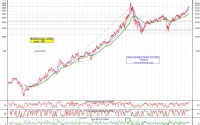Nebius Group: Is the AI Hype Outpacing Reality, Or Is the Market Just Missing the Memo?
Let’s talk about Nebius Group N.V. For anyone watching the AI infrastructure space, they’re a name that’s been buzzing. They’ve just dropped their Q3 ’25 numbers, and if you squint, you might see two entirely different companies. On one hand, a staggering 355% year-over-year revenue jump to $146 million. Impressive, right? But then the cold splash of reality: Wall Street expected $155.4 million, and Nebius missed the mark. The market, as it often does, reacted with a shrug and a sell-off, knocking NBIS stock down approximately 7.6%—to be more exact, it was 7.69% at one point on November 10th and 11th. This reaction was detailed in Nebius Group (NBIS) Is Down 7.6% After Landmark Microsoft Deal and Token Factory Launch – Has the Bull Case Changed? - Yahoo Finance.
Now, for a company in the thick of the AI gold rush, a revenue miss, even a small one, is a big deal. It’s like showing up to a high-stakes poker game with a great hand, but then folding on the first bet. But here’s where the narrative gets truly fascinating, bordering on the bewildering. Just before these Q3 numbers hit, Nebius wasn't just making headlines; they were rewriting the rulebook. We’re talking about a landmark US$19.4 billion, five-year GPU infrastructure contract with Microsoft. That’s not a rounding error; that’s a game-changer. And as if that wasn’t enough, they also raised over US$4.2 billion for data center expansion and launched Nebius Token Factory, a full-stack AI production inference platform. These significant developments prompt further analysis, such as in Nebius: Microsoft, Then Meta - Now What? (NASDAQ:NBIS) - Seeking Alpha. So, how do you reconcile a minor revenue miss with a multi-billion-dollar deal and a massive capital injection? This is the kind of discrepancy that makes me lean forward in my chair.
The Disconnect: Billions in Future, Pennies in Present
The conventional wisdom, the 'buy thesis' as the analysts like to call it, remains staunchly intact for NBIS. The argument goes that this miss is just a blip, a small tremor in the rapid growth trajectory of a company perfectly positioned in the expanding AI infrastructure market. And frankly, with a $19.4 billion Microsoft contract now firm, strengthening Nebius’s near-term visibility, it’s hard to completely dismiss that. That contract isn't just revenue; it's a stamp of approval from a tech titan, a critical catalyst that screams "we're serious." The Nebius Token Factory, too, is designed to address scale, governance, and performance hurdles for enterprises adopting AI, essentially building a recurring revenue stream from these large contracts. It’s a smart play, a classic 'picks and shovels' strategy in the AI gold rush, where Nebius isn't just digging for gold, they're selling the shovels, the sieves, and the maps.
But let’s pump the brakes for a second. While the future looks undeniably shiny, the present has some peculiar shadows. The company's narrative projects a whopping $3.2 billion revenue and $428.7 million earnings by 2028. To hit those numbers, they’ll need to sustain an eye-watering 133.9% yearly revenue growth from their current base. I’ve looked at hundreds of these filings, and this particular footnote outlining such aggressive growth targets, especially after a Q3 miss, is unusual. It’s like planning to build a skyscraper with a blueprint that assumes you'll double your construction speed every year, even though you just missed your foundation pouring deadline. Can they do it? Maybe. The question is, what are we betting on: the concrete numbers of today, or the architectural renderings of tomorrow?

This brings us to the valuation. The community's fair value estimates for NBIS are all over the map, swinging wildly from US$9.17 to US$176.90. This kind of divergence isn’t just healthy debate; it’s a red flag waving furiously. It suggests that analysts either have vastly different models, or they're working with fundamentally different assumptions about the company's future execution and market capture. My analysis suggests that the market is already pricing in a phenomenal amount of future success. Their valuation ratios — P/E 104.22, P/S 93.73, P/B 6.06 — are significantly above historical medians. These aren't just high; they're stratospheric. It implies that every single future growth projection, every potential contract, every market share gain, is already baked into the current share price. Any stumble, any deviation from that aggressive 133.9% annual growth, could lead to a swift re-evaluation.
The Accounting Behind the AI Curtain
Now, let's peel back another layer, because the financial health indicators present a fascinating dichotomy. Nebius Group NV, a European tech company (operating in the Interactive Media industry, a segment known for its capital intensity and high growth potential), shows strong stability with an Altman Z-Score of 13.71 and a low likelihood of earnings manipulation with a Beneish M-Score of -5.62. Good stuff. Their current ratio is a robust 14.7, and debt-to-equity is a manageable 0.32. This isn’t a company teetering on the brink of insolvency.
But then you hit the margins. A negative operating margin of -197.22% stands out like a sore thumb. How does a company burn that much cash operationally, yet report a positive net margin of 102.66% and an EBITDA margin of 147.39%? This is where the story gets intriguing. It strongly suggests that the positive net and EBITDA margins are driven by significant non-operating income, perhaps from asset sales, investment gains, or other one-off events that aren't tied to the core business of selling AI infrastructure and services. While not necessarily nefarious, it means the underlying profitability of their actual operations is deeply in the red. I can almost hear the collective gasp from traditional finance analysts looking at that operating margin, then a quiet, knowing nod as they spot the net margin, understanding exactly what kind of financial engineering is at play. It's a critical point for investors to understand: the narrative is about scaling AI infrastructure, but the current operational economics aren't yet self-sustaining. This isn't a long-term problem if the Microsoft contract and Token Factory deliver recurring, high-margin revenue as promised, but it's a massive "if."
The risks are real: regulatory hurdles, compliance costs, and localization expenses could certainly limit global expansion. The stock's beta of 1.48 means it’s more volatile than the overall market, a characteristic that appeals to risk-tolerant investors, which, let's be honest, is anyone buying into the AI infrastructure space right now. Nebius has a proven executive team and R&D hubs across three continents. They are positioned well. But positioning isn't execution.
The AI Infrastructure Bet: High Stakes, Higher Expectations.
Nebius Group is a fascinating case study in the current AI boom. They’ve secured monumental contracts and raised significant capital, painting a picture of a future titan in AI infrastructure. Yet, their Q3 revenue miss and deeply negative operating margins serve as a stark reminder that even in hyper-growth sectors, the numbers eventually have to align with the narrative. The market is betting big on Nebius’s ability to turn potential into profit, and that bet is priced incredibly high. For investors, it's not just about believing in AI; it's about believing Nebius can defy gravity and meet the most aggressive growth targets I've seen in years.










